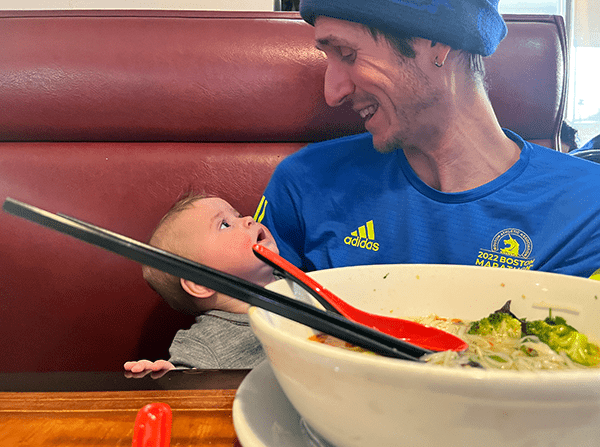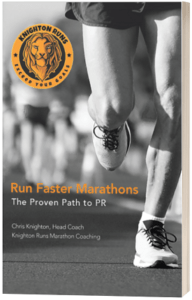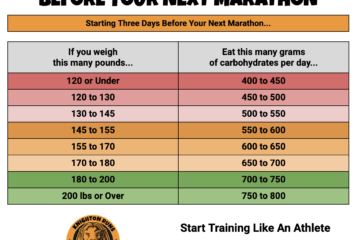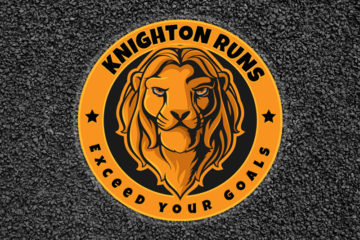Proper Nutrition for Distance Runners
This post was written by Coach Chris Knighton

Disclaimer: The content on this site is for informational and educational purposes only, and does not substitute professional medical or nutritional advice, or consultations with healthcare or nutritional professionals. Please consult your own qualified doctor or nutritionist before making any changes to your nutrition or taking any supplements. Disclosure: This article may contain affiliate links. When you buy through links on our site, I may earn an affiliate commission. As an Amazon Associate I earn from qualifying purchases.
The Role of Proper Nutrition for Distance Runners
Proper nutrition plays a huge role in the health and performance of distance runners.
This article gives a nutrition overview of what constitutes a healthy and supportive diet for distance runners. It also highlights some of the key vitamins and minerals distance runners should focus on to ensure long-term health while performing their best.
It is important to remember that as an athlete, you improve not simply from the workouts that you do, but by finding the proper balance between hard work and recovery between training sessions.
Eating an excellent diet is one of the main things that you can do to ensure you get the proper recovery needed to reach your highest levels of performance.
Listen to The Article in Podcast Format
What is a Healthy Diet for a Distance Runner?
In general, distance runners should strive to eat a well-rounded diet rich in carbs, proteins, and fats.
Your body burns both carbohydrates and fat for fuel when running. The primary fuel used for moderate to fast running is carbohydrates, and the primary fuel for slow running is fat. Training over longer distances and at slower speeds can help your body become better at using fat for fuel, but both sources are burned in some ratio at all speeds.
Distance runners should aim for a target of 70% of their calories from carbs, 15% from protein, and 15% from fat during weeks of intense training. This 70/15/15 ratio does not need to be precise but is easy to remember when planning out your daily meals. During periods of less intense training, consuming as little as 50 to 60% of your calories from carbohydrates may be optimal, depending on your body type. For more information on this subject, refer to this study.
Benefits of Plant-Based Diets
Athletes can perform well on just about any kind of diet, but one consisting primarily of whole-food plants is capable of providing many long-term health, recovery, and performance benefits.
Unprocessed plant foods such as whole grains, beans, nuts, seeds, and a colorful array of fruits and vegetables should take center stage and make up the majority of a distance runner’s diet to ensure peak health and longevity.
Small amounts of processed food, snack food, refined grains, meat, eggs, and dairy can play a role in a healthy and well-rounded athletic diet, but they should be eaten in moderation. These foods typically do not provide the same health benefits as the whole plant-based foods previously mentioned, and may even pose health risks themselves.
Athletes who refrain from eating certain types of food such as meat, dairy, or gluten need not worry. Distance runners can perform exceptionally well and meet all of their nutritional needs on healthy vegetarian, vegan, or gluten-free diets. In fact, vegans and vegetarians are likely to be healthier than their counterparts who eat a “Standard American Diet.”
It should be noted that there are no “bad” foods. All foods, even those often thought of as “treats” or “junk food” can fit into a healthy diet when eaten in moderation. Above all, it is the focus on eating healthy choices and consuming a colorful variety of foods that matters most, not specifically what foods are eaten.
Distance Runners Need More
When you are training at a high level, it is essential that you eat enough. One of the most common issues athletes face is actually the “under-consumption” of caloric energy during periods of hard training.
Runners burn approximately 100 calories for each mile run and need to replenish those calories plus some after each training session. Skipping meals will most likely have a negative outcome during training and racing because your body will not be given the essential building blocks it needs to help you recover from your runs and grow stronger.
Athletes have different nutrition needs than their less-active peers. Athletes must eat more calories and drink more water than less active individuals to best fuel their sports performance and ensure long-term health.
Staying Hydrated
Water is the best source of hydration for distance runners.
There are many different electrolyte mixes and electrolyte tablets on the market that can help runners stay hydrated and provide a variety of delicious flavors that could be more interesting to you than plain water.
Consider bringing a hand-held water bottle with you during your long runs and workouts if water will not be available en route. I like this small bottle, but you may prefer a larger bottle for hotter or longer runs.
Additionally, coconut water, fruit juice, and sports drinks can be used both during and post-run to rehydrate water and refuel calories.
While coffee, tea, alcohol, and soda can all play a role in an adult athlete’s healthy lifestyle, they should not be used for hydration purposes. Stick with water first and foremost when it comes to hydration.
How Much Should You Drink?
In general, simply drink to thirst.
If you are thirsty either during a run or at any time throughout the day, your body is telling you to drink up.
It can be a very good idea to drink a tall glass of water (~16oz) before heading out for a run and immediately upon coming home.
Many of us do not drink enough. To help yourself stay better hydrated, keep a full water bottle with you at all times or try to remember The Rule of 8 – eight times throughout the day, and drink a big glass of water.
If it’s over halfway through the day and you haven’t drunk four glasses yet, go drink up!
Pay Extra Attention to These Vitamins and Minerals
Distance Runners should pay attention to several key vitamins and minerals to ensure they are getting enough of them.
Maintaining proper levels of Iron, Calcium, and Vitamin D is essential for distance runners. These vitamins and minerals help you build a strong skeletal-muscular system that can support the high-impact demands of running. Oftentimes a supplement is necessary to reach the appropriate amount needed for these nutrients.
If you have a physical coming up it’s a great idea to ask for a comprehensive blood panel, including Iron, Calcium, and Vitamin D to ensure you are meeting the nutritional needs required by an athlete.
Both Coach Chris and Erica speak from experience, having been deficient at various times throughout our lives with both Vitamin D and Iron. In our cases, supplementation on the advice of our doctors was helpful to get our blood levels back to normal.
Calcium
Maintaining calcium balance is essential for promoting good bone health. This is done by
consuming enough calcium in the diet. Calcium consumption takes the forefront as a major
component in bone health. The human skeleton acts as a storage system of calcium. If enough
calcium is not consumed in the diet, the body will pull from bone calcium stores to fulfill its
metabolic purpose.
Distance runners need to build strong bones so that they can train hard while minimizing the risk of stress reactions or fractures to their bones.
How do I know if I am low on calcium?
Low levels of calcium can cause extreme fatigue, which involves a lack of energy and an overall feeling of sluggishness. It can also lead to insomnia. Fatigue associated with a calcium deficiency can also involve dizziness and a lack of focus.
Sources of Calcium include:
- Beans and Lentils
- Almonds
- Plant-based Milk
- Leafy Greens (e.g., Kale, Spinach, Collard Greens)
- Rhubarb
- Fortified Cereals
- Edamame
- Tofu
- Chia Seeds
- Dairy Products
- Sardines and Canned Salmon
Vitamin D
Vitamin D helps your immune system function effectively, reduces inflammation, and helps your body absorb calcium. Calcium is a mineral that gives strength to your bones and teeth and helps your nerves and muscles function properly.
A lack of Vitamin D can cause bones to weaken, which can lead to bone deformities and put runners at risk of bone stress reactions and fractures.
How do I know if I have Vitamin D deficiency?
Vitamin D can be a difficult vitamin to get enough of, especially if you live in a northern climate that does not get much sun year-round.
Symptoms of Vitamin D deficiency can include muscle weakness, bone pain, fatigue, and depression.
Vitamin D is not naturally found in many foods. In lieu of consuming it, our bodies manufacture Vitamin D from exposure to sunlight. Due to the skin health and cancer risks associated with sunlight exposure, it is generally not recommended to seek out the sun specifically to get Vitamin D.
Taking a Vitamin D Supplement may be the best recommendation for most adults to reliably get Vitamin D. Please consult your doctor for qualified advice prior to taking any supplements.
Sources of Vitamin D include:
- Orange Juice fortified with Vitamin D
- Plant Milk and Dairy Milk fortified with Vitamin D
- Fortified Cereals
- Mushrooms
- Cod Liver Oil
- Salmon
- Swordfish
- Tuna Fish
- Egg Yolks
- Vitamin D Supplements
Iron
Iron is a mineral that the body needs for growth and development. Your body uses iron to make hemoglobin, a protein in red blood cells that carries oxygen from the lungs to all parts of the body, and myoglobin, a protein that provides oxygen to muscles.
It is necessary to consume adequate amounts of iron in your diet to preserve these essential bodily functions. Runners lose iron during training and therefore need to consume more iron than non-runners. If you fail to intake enough iron, you may develop an iron deficiency, which can result in a condition called anemia.
What are signs you might be anemic?
Being anemic might mean that you feel more tired, fatigued, and weak. Additionally, your skin might appear too pale. When running with anemia, you could experience shortness of breath or an inability to complete your run.
Distance Runners should recognize that there is a link between their iron levels and how well their bodies can process oxygen to fuel fast running. While non-athletes may be considered within the normal range with “lower but non-anemic iron levels”, the competitive distance runner will want to consult with their doctor to ensure their iron and their associated ferritin levels are optimal for top performance.
If you think you may be low on iron or anemic, please consult your doctor for qualified advice.
Sources of Iron include:
- Beans and Lentils
- Tofu
- Spinach
- Quinoa
- Dried Fruits (e.g., apricots, prunes, raisins)
- Broccoli
- Nuts
- Fortified Cereals
- Pumpkin Seeds
- Shellfish
- Red Meat
- Dark Turkey Meat
- Iron Supplements
How to Time Your Meals
Distance runners need to not only eat more than their sedentary peers, but they also need to plan the timing of their meals around training sessions and competitions to feel and perform their best while running.
Eating small meals every two to three hours can help you maintain consistent energy throughout the day. Meals should include protein, fat, and complex carbohydrates, keeping in mind the 70% carbs, 15% protein, and 15% fat guideline for distance runners in heavy training.
Stay hydrated throughout the day. Drink at least 8 oz of water each hour even when sedentary, and more if it’s hot out.
Eat a snack after every workout and have a meal shortly thereafter. Refueling quickly after completing a workout or competition is essential to jumpstart your recovery and ensure you reap the benefit of your hard work.
Never skip meals.
Guidelines for Meal Timing
Pre-workout Meal: 2 to 3 hours before training or competition
Pre-workout Snack: 1 hour before training or competition
Post-workout Snack: 0 to 30 minutes after training or competition
Post-workout Meal: 0 to 2 hours following training or competition
Evening Snack: 2 to 3 hours after the last meal of the day
Sample Meals for Distance Runners
Pre-workout Meal: 16 to 20 oz of water and peanut butter on whole grain
toast with fruit on the side.
Pre-workout Snack: 5 to 10 oz of water, a low-fat granola bar, a banana, and white bread.
During Training or Competition: Hydration demands vary greatly based on climatic conditions. 18 oz of water or sports drink per 60 minutes of activity is a good rule of thumb to help replace sweat loss, but this can vary greatly. Drink to thirst and never purposefully restrict water. Likewise, consuming energy gels during sessions over 60 minutes can help replace carbohydrates during moderate to intense activity.
Post-workout Snack: A fruit smoothie, protein shake, granola bar, chocolate milk, yogurt, or a peanut butter and jelly sandwich.
Post-workout Meal: Low-Fat protein sources, tofu, beans, colorful vegetables, whole grain pasta,
rice or bread.
Evening Snack: Low-Fat popcorn, toast and nut butter, or cereal with plant milk.
Endurance Nutrition Tip: Decreasing fiber and protein intake pre-workout can help reduce stomach discomfort during long training sessions. For those with sensitive stomachs, liquid meal replacement shakes or homemade versions are good alternatives to consuming bulky solid foods before a hard session or race.
For more info, check out…
The Knighton Runs Podcast – Episode #47: Fuel Your Run! Running Nutrition with Kristy Baumann (@marathon.nutritionist)
Kristy Baumann is a Registered Dietitian who helps runners learn how to fuel properly to support their training and have a healthy relationship with food.
In this episode, we discuss the importance of developing a positive relationship around food while marathon training and get answers to specific nutrition and diet questions from The Knighton Lions.
Listen Here
Dive Deeper into Running Nutrition
Check out Kristy Baumann’s Fuel Your Run Nutrition Course
Kristy’s Fuel Your Run Nutrition Course is for you if you…
- Feel confused about what, when, & how much to eat before, during, & after a run
- Are training for an upcoming race: 5k, 10k, half or full marathon
- Find yourself struggling to recover or want to avoid raiding the pantry after long runs
- Are experiencing stomach/digestive problems on the run and want to prevent them
- Want to avoid ‘hitting the wall’ on race day and set a new PR
- Are ready to create a personal fueling & hydration plan
- Want to prevent injuries and be a lifelong healthy runner
- Inside Fuel Your Run you’ll get access to:
- The course material and all updates made in the future.
- Kristy’s Fuel Your Run Facebook community, where you can ask Kristy questions at any time and learn from other runners in the community.
- The course also includes exclusive discount codes on sports nutrition products!
Click Here to check out the Fuel Your Run Nutrition Course
Note from Coach Chris
I’ve personally taken Kristy’s course and absolutely loved it. I’m excited to promote the Fuel Your Run Nutrition Course. It is the best resource I’ve found to fully understand running nutrition and gain the confidence you need to fuel well throughout your run training. The links to the course above are affiliate links and a may earn a commission from Kristy for recommending this course to you.


